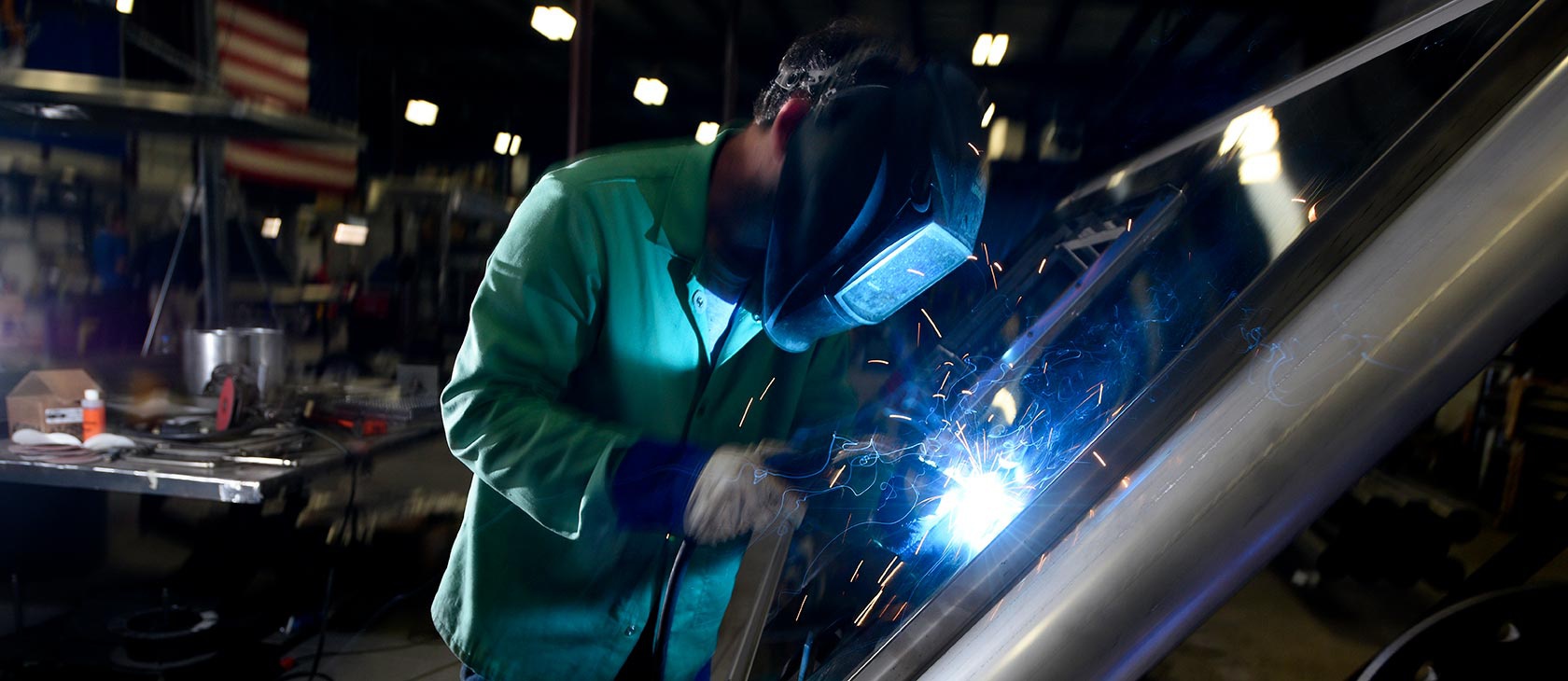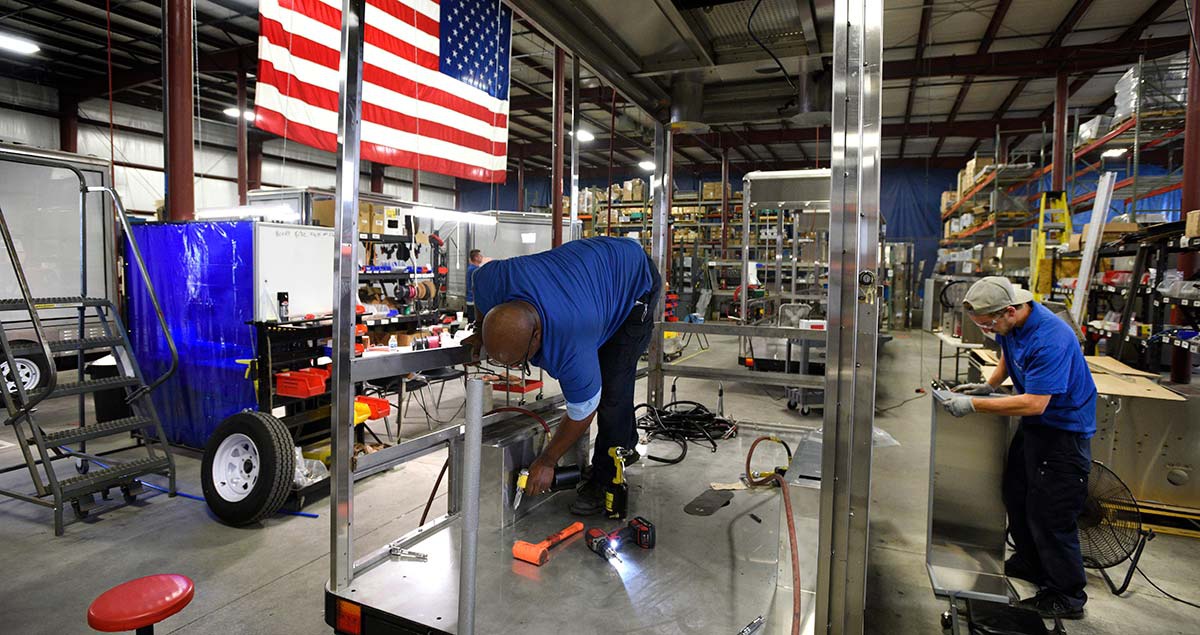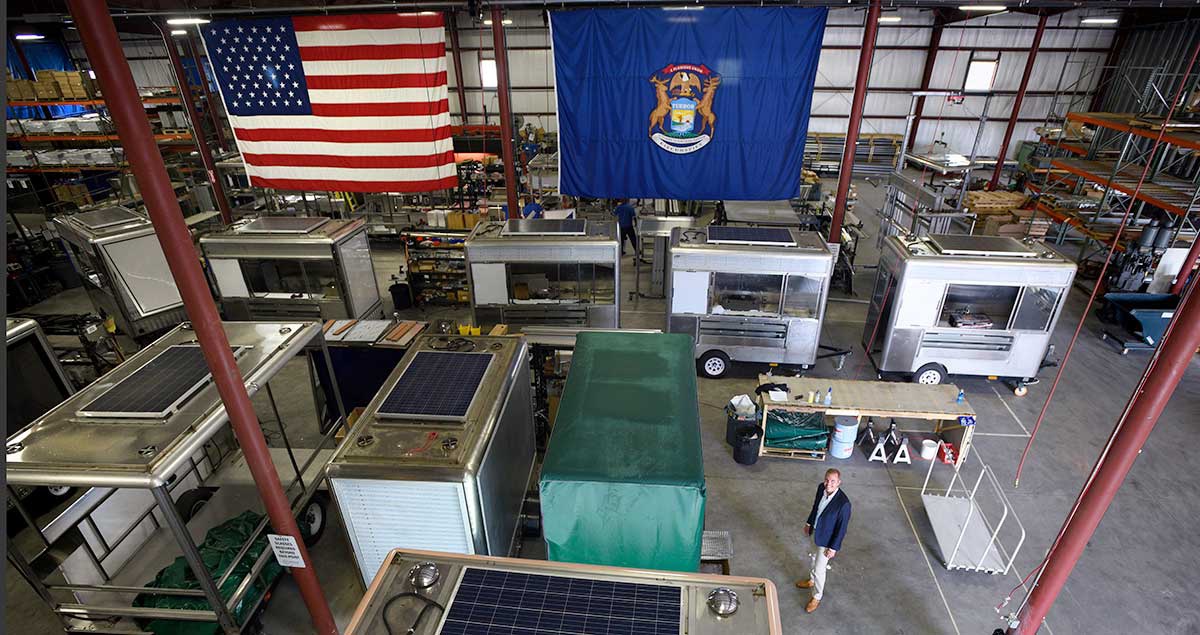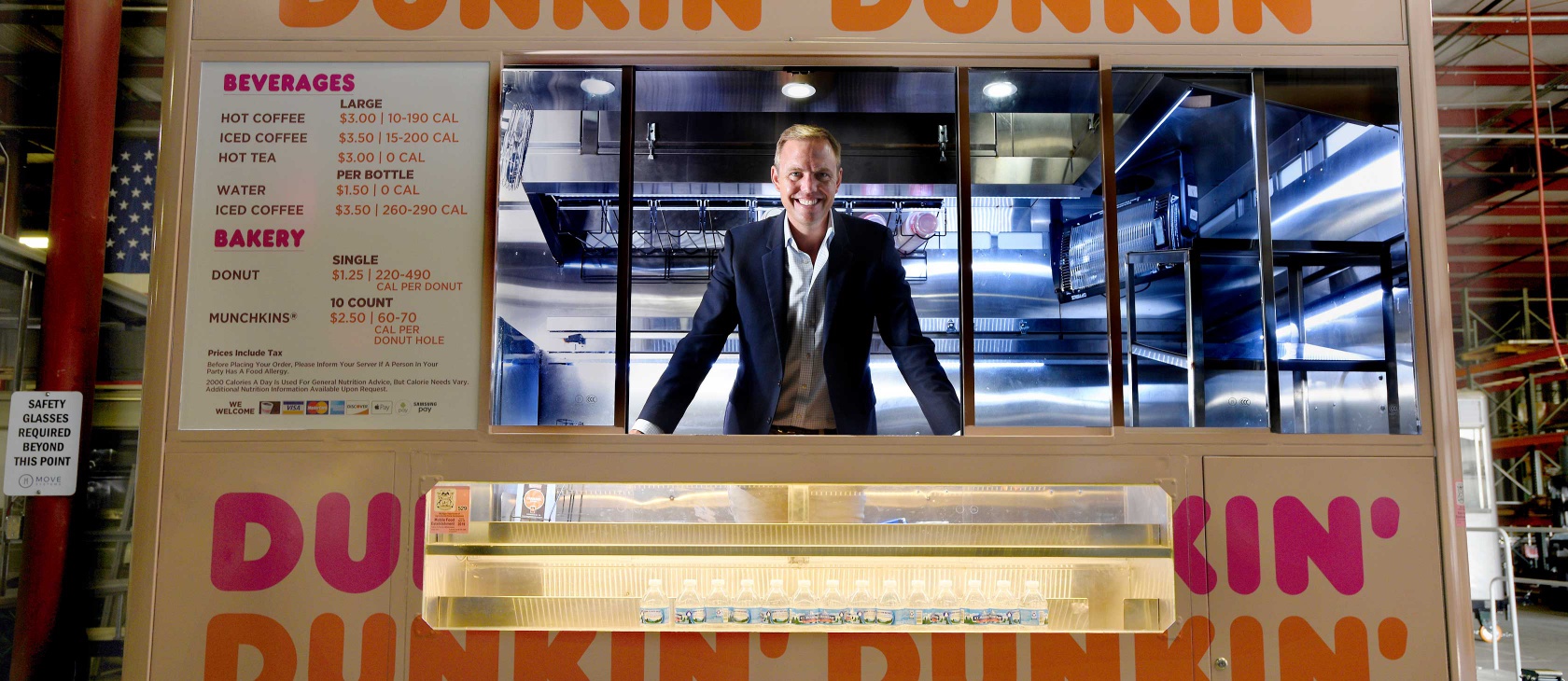In a country where Americans always appear to be on the go, some question whether they have the time left to invest in the traditional dining experience at a brick-and-mortar restaurant. That’s the nearly $3 billion dollar question facing the food service industry and, on this sunny August day just outside Grand Rapids, Michigan, James Meeks was preparing a pitch for one his company’s $65,000 food trucks.
The 39-year-old Meeks is the CEO of MOVE Systems LLC, a start-up business looking to revolutionize the food industry with environmentally-friendly food trucks equipped with solar panels.
In his office, there were one-page sheets stacked on a table. Meeks pulled them out and reviewed each one – all a different concept for a food truck business. The sheets showed a smorgasbord of food trucks including offerings for avocado toast, pasta, tacos, pizza, espresso, hamburger and hot dogs. And brand names such as Dunkin Donuts.
And what is Meeks’ response to the brick-and-mortar restaurants that claim food trucks are robbing them of customers? Start your own. His vision is to have food trucks tethered to a brick-and-mortar restaurants as street-side extensions. He calls it creating a mini-business or “mobile cafes” that are an expansion of the existing restaurants.
Such a food truck would “activate city spaces.” Where once was empty asphalt, you drop a pizza or donut truck. A food truck at every corner? “Right here,” Meeks said as he sat in his Michigan office. “You got to drive four miles to get a bite here.”

“Here” would be the Grand Rapids suburb of Walker where MOVE Systems expanded in 2017 in an industrial park. The building couldn’t be further away from its New York City office, both in location and lifestyle.
Meeks chose Michigan for expansion, in part, for family reasons. His wife Jennifer Meeks works as an administrator at a Grand Rapids’ hospital. Jennifer is supportive of her husband’s start up business. “It’s just recognizing we as a country are moving to the speed of which things are go-go-go in every aspect,” she said. “I think he is on to something.”
Jennifer says her husband is not your typical Wall Street CEO type.
Meeks has a diverse background that is part Wall Street, part Armed Forces and part tree-hugger.
He has degrees from Harvard and the Stanford Graduate School of Business. Yet, he is also a highly decorated Army veteran who survived a roadside bomb explosion in Iraq. He got a Bronze Star for rescuing an Iraqi family from a burning building. And he is the unpaid president of a non-profit that helps some of the poorest people in Africa learn how to grow and market products.
Meeks has a diverse background that is part Wall Street, part Armed Forces and part tree-hugger.
His story is not something people are likely to read on social media – which happens to be Meeks’ blind spot. As he sat in his office in August, he was told his Twitter account had a grand total of 17 tweets posted since it was created in 2012. Meeks smiled. “Is that a lot or a little?” he asked.
Jennifer is not surprised. In fact, says her husband’s activities on Twitter are simply reposting other people’s Tweets. “He’s not a social media guy,” she said. “He’s a book reader.”
Jennifer says that James has 50 boxes full of books, mostly about history and philosophy. And his favorite books highlight the complexities of James Meeks. This is a man whose first conversation with his future wife happened at a dinner party and lasted 45 minutes. The topic was explaining the various sects of Buddhism, generally not first-date conversation.
Jennifer said that was part of the intrigue. And she eventually learned her future husband was far from typical. Among Meeks’ favorite books are The Art of War, the centuries old book written by Sun Tzu. Then there’s From Dawn to Decadence, 500 Years of Western Cultural Life, which was published in 2000 by historian Jacques Barzun. But the book James reads every night is the Episcopalian’s Book of Common Prayer. The books that fill their home, Jennifer says, all play a role in helping her husband find a balance in life.
“When you are the CEO of a startup, it is not as glamorous as you read on the front page of the Wall Street Journal. You work seven days a week and you are always on. You don’t really have a Saturday and Sunday,” Jennifer said. “I love capitalism, but capitalism can ask one to squeeze blood from a rock. Start-ups are a cut-throat business. That’s why Jim reads these books. He needs that.”
James writes notes and marks up all his books. There are horizontal lines, single lines, double lines emphasizing passages that have registered with him. Jennifer has learned that the larger the ear mark, the more involved her husband is with that section of the book. The history book From Dawn to Decadence gives Meeks perspective, his wife says. It reminds him that great people of history faced tremendous challenges.
Jennifer is a California native and a former NBA cheerleader with the Washington Wizards. In 2012, she agreed to tell the story of their courtship to the Washington Post. The result was a nearly 1,000 word story that Meeks still blushes about today when it is brought up.
They met at a dinner party. Jennifer said she was raised Buddhist. James told her he studied Buddhism while taking a year off from college to do a fellowship. On a date early on in the relationship, James impressed his future wife by speaking fluent Spanish with the server at a restaurant. He speaks three languages, including Swahili, which he learned while working for his non-profit 2Seeds while in Tanzania.
When you are the CEO of a startup, it is not as glamorous as you read on the front page of the Wall Street Journal. You work seven days a week and you are always on.
James proposed to Jennifer with a $1 toy ring. “I had planned for weeks when I was going to propose to Jen, but the engagement ring I had designed for her was late in arriving,” Meeks said. “I wanted the day to be special -- a recreation of the date in which we both said we fell in love -- and had I waited for the ring I would have missed the opportunity. I took the risk that the proposing without the engagement ring, as I didn't want to wait a day longer delaying our engagement.”
The toy ring was later replaced by the real engagement ring. But it’s not forgotten. Or lost. Jennifer still has the $1 plastic ring that she keeps in a nightstand in the original black velvet box in their home in the Grand Rapids area. It’s the home they make with their 4-year-old son and 1-year-old daughter. Jennifer says it is only those closest to her husband who realize how much a role religion plays in his life.
In 2013, Jennifer was baptized into the Episcopal church. Prior to her conversion, she took a class for nine months to learn about her new religion. James attended the classes with her, and then flew out of the state the next morning. He did that the entire nine months. “Most people don’t know he is a devout man of faith,” Jennifer said. “It keeps him going. He has seen life and human beings at its ugliest.”
The ugliest would involve Meeks’ two tours in Iraq. Meeks didn’t have the typical background of an Army soldier. He graduated from an Ivy League school. He said he had no intention of every volunteering for the military.
Then September 11 happened.
On Sept. 11, 2001, Meeks was going for a run on campus. As he was returning he noticed his roommates watching TV. “They are never up this early,” Meeks thought.
When he learned of the terrorist attacks, he went to his church where he was a head usher and held a vigil. But the attack would forever change his life. As the editor of the Harvard International Review before 9/11, Meeks attended a forum on terrorism and came away not overly concerned about the threat of an attack on American soil. “It’s a Northern Ireland thing,” he said of how he viewed terrorism pre-9/11.
“I had no intention of joining the military before 9/11,” Meeks said. “But if guys are going to war, I want to be with them.”
After Meeks graduated from Harvard a year later, he enlisted in the U.S. Army. “I do believe he has a tremendous love for this country,” said Jeffrey Hoffman, a vice president at MOVE Systems as well as the general counsel. “He decided that instead of going and getting a job on Wall Street, he went and served his country.”
Meeks enlisted as a private and then went to Officer Candidate School and graduated with the rank of lieutenant. He was trained as a tank commander at Fort Knox but his assignment in his first tour of Iraq was overseeing a prison ward. The prison was meant to hold about a dozen prisoners, but there were 114 detainees assigned to Meek’s prison. Meeks supervised as many as 10 soldiers. Meeks said the U.S. soldiers he led would go out on patrol and see their friends get killed and then come back and have to watch over Iraqi insurgent prisoners.

“That’s a disaster waiting to happen,” Meeks said.
He mixed up when he would make spot checks on his soldiers while they were watching the prisoners. Sometimes he’s go at 4 a.m., other times 2 a.m., and then sometimes at 11 p.m. He did it to ensure the prisoners were not abused. “It’s for your own good,” Meeks would tell his team. “I don’t want to have to put you in jail.”
In 2004, Meeks was in the front seat of a truck that had 20 Iraqi detainees in back. Meeks was part of a convoy on a road the army had given the code name “Route Michigan.” It was common for that stretch of road to be littered with numerous roadside bombs. “The last one got me,” Meeks said.
He heard the sound of a big crack. Then there was a blast and a flash of light. Meeks closed his eyes. Moments later when he opened them, the driver was gone, he couldn’t see out of his right eye and his right arm was totally shredded, “like a knife through butter,” Meeks said. “There was blood everywhere.”
He had 113 pieces of shrapnel removed from his right arm, and he lost hearing in his right ear. Meeks received a Purple Heart for his injury. Meeks recovered from the roadside bomb injuries and volunteered for a second tour of Iraq. “I didn’t want the Iraqis to think they got me,” Meeks said.
While in Iraq on his second tour, he also was awarded a Bronze Star. There was a pro-U.S. Iraqi base that was ambushed. Meeks and his team responded. During a firefight in a two-room house, it caught on fire. The first room had been full of Iraqi insurgents that Meeks and his team had neutralized.
Meeks believed there were still people in the second room. He said he couldn’t order his own men to go into the room because it could have been more hostiles. But Meeks thought if there were more insurgents in that second room, they would have already attacked the U.S. troops. With the house on fire, Meeks went into the second room and found an Iraqi woman and several children and escorted them out.
Meeks’ support for the military didn’t end with his service. It is part of MOVE Systems mission to hire and retrain military veterans. There is a plaque on the wall of the lobby in the Michigan office that pledges support for the National Guard and Army Reserve.

Meeks joined MOVE Systems in 2014. Meeks was mentioned by one of the original stakeholders as a CEO candidate. MOVE Systems Vice President Hoffman said there was no typical candidate in a search for a start-up company offering an innovation in the food truck business.
Hoffman said Meeks’ experience with Swissport, an aviation company that oversees more than 30 airports throughout the Western Hemisphere, was intriguing. Meeks worked for Swissport for 19 months and became the Senior Vice President for Business Development & Operations Support.
A year after Meeks was hired, MOVE System’s first big break came in May 2015. That’s when the New York City Council announced a pilot program to provide 500 eco-friendly food carts throughout New York City. There are 5,100 permitted food carts in New York City that serve an estimated 1.2 million meals a day. A single MOVE System MRV100 food truck is powered by natural gas and claims to take the pollution equivalent of nearly 200 cars off the road when compared to the older propane-powered food trucks.
MOVE Systems provided the food trucks at no cost to the first 500 vendors in New York City who signed up to switch from their old trucks to the MOVE Systems food truck. Food trucks can also be leased from MOVE Systems.
The food truck business has reportedly grown from a $650 million industry in 2012 to a projected $2.7 billion in 2017.
The food truck business has reportedly grown from a $650 million industry in 2012 to a projected $2.7 billion in 2017. However, not everyone is excited about the growth of the industry. Food trucks, critics say, take customers away from established businesses and some cities have passed ordinances to keep them a safe distance from brick-and-mortar restaurants.
In Chicago, “mobile food vendors” are restricted from operating within 200 feet of brick-and-mortar restaurants. Food cart vendors challenged the 2012 ordinance in court and lost. An Illinois appeals court panel ruled 3-0 in 2017 that the ordinance was legal.
Meeks becomes animated when defending his food trucks. He sees his enterprise not as a competitor to traditional brick-and-mortar businesses, but as a complementary expansion. “Why would you want to stop commerce?” Meeks asked about those critical of food carts. “Why would you kill a good business?”
“When someone goes to a restaurant with a table, they are looking for a different experience,” Meeks said as he sat in his modest office decorated with a plain wooden table and accompanying wooden desk. “The consumer is going to demand two things – convenience and the experience of the interaction. If you can’t provide those two things, you will be left behind.”
However, not everyone Meeks interacts with has the capability to have food provided in such a convenient manner. Meeks started a non-profit to teach people in Tanzania how to be more self-sufficient in feeding themselves.
He was introduced to Tanzania at 21. Meeks was baptized Episcopalian and started spending time with a monk from the Society of St. John the Evangelist religious order. In 2007, that monk – Bishop Tom Shaw who was the 15th Bishop of Massachusetts – invited Meeks to join him on a mission to Tanzania in eastern Africa.
Seventy percent of the 45 million people who live in Tanzania exist below the poverty line of $1.25 a day. Just 15 percent of the people had access to electric power in 2011. “These were the poorest of the poor,” Meeks said.
Yet the trip stuck with Meeks. He saw what he calls “an economic inefficiency” and another entrepreneurial idea was born. Meeks formed 2Seeds, a non-profit that matched United States college students with Tanzanian farmers. Meeks serves as chairman but didn’t receive any compensation, according to documents filed with the federal government. At its peak, 2Seeds had an operating budget of nearly a half million dollars.

College students with no expertise would go to Tanzania and work on projects to help upgrade the lives of Tanzanian families. For example, in 2016 the 2Seeds non-profit helped build a storage unit that stood eight meters by six meters. It had a cement floor to prevent termites from eating their crops stored in the unit. That unit took nearly three months to build. The students work with the villagers to teach them to how properly cultivate and market their crops.
One 2016 post on the 2Seeds Facebook page celebrates packaged Cayenne pepper that was grown and produced in a small village then being sold in a store at Dar es Salaam, the most populous city in the country.
Today, Meeks said that much of the work of 2Seeds is now done by the Tanzanian partners. He says that is a sign that his non-profit has succeeded. “Wherever I go, making sure life has meaning is important to me,” Meeks said. “I need to know that the work I’m doing has a positive effect beyond keeping the lights on in my house.”
Back in the United States, co-workers and colleagues say Meeks’ compassion stands out. People who meet James Meeks say he has a way of making someone feel like they are the center of attention.
Gerald Hopkins, the superintendent of Kenowa Hills Public Schools, first met Meeks in 2016. Hopkins told him that they wanted to open a facility within the district for a STEM (Science, Technology, Engineering, Mathematics) class but that the infrastructure upgrade would be as much as $2 million. “Bummer,” Meeks told Hopkins.
But Meeks came up with a better idea. He would open up his Michigan manufacturing facility and lease space to the school district. The students would learn inside an actual manufacturing plant. The state of Michigan approved the collaboration.
Every time you go over there, he drops everything and makes you feel like you are the most important person in the room.
“It was kind of a ‘Shark Tank’ moment,” Hopkins said, referring to the ABC TV show that has aspiring entrepreneurs pitching their business ideas. “He said, ‘Love the idea. Love the concept. Your vision isn’t big enough.’ He said, ‘We’d like you to build this under our roof.’ And he handed us the keys. My jaw dropped.”
Hopkins has kept in touch with Meeks since that first meeting. “Every time you go over there, he drops everything and makes you feel like you are the most important person in the room. I’m sure he has his own dreams.”
During an interview with Meeks, a writer began telling a personal anecdote about his life when a buzzer went off alerting Meeks there was someone at the facility. “Wait a minute,” Meeks said as he got up to attend to business, but assured the writer he would be back. “I want to hear this.” Later, as Meeks walked through his facility, he hesitated and then walked to a table where a small plastic container was sitting.
It was a Friday, a day off for the plant’s workers who work four-day, 10-hour shifts. Inside the container was a home-made honeycomb treat. But for Meeks, this was not just a mid-afternoon snack. It was a business opportunity, although not one for him.
It was a budding business, and nothing appears to pique his interest more than an entrepreneurial opportunity. Meeks was selected to be a member of Endeavor Detroit in 2017. That’s a network of business leaders that provide assistance to entrepreneurs. Meeks doesn’t hesitate to pay it back.

Meeks snapped up the plastic container. It was left by a welder who works for Meeks. The welder’s family owns a small plot of land where they are trying to start a honey business. Inside the container were three pieces of honeycomb soaked in honey. Meeks completed the tour of his plant for a visitor, and headed back to his office, plastic container in hand. “One of my factory workers has his own business,” Meeks said. “I’m trying to coach him on it.”
He opened the container and took a bite of the honeycomb. “Delicious,” he said.
The welder is 28-year-old Jacob McAlvey, who has been working for Meeks for 18 months. McAlvey said that Meeks takes interest in his employees beyond their work for his company. McAlvey is trying to juggle the honey business while also working his full-time welding job for MOVE Systems.
“He told me, ‘Hey, if you need some time to work your business, that is fine,” McAlvey said. “I can’t be grateful enough for that. He’s phenomenal in how he motivates people.”
McAlvey tells the story about how another worker at the Michigan factory who suffered a tragedy when a relative died in a car accident. Meeks showed up at the hospital with the employee. “They said, ‘Anything we can do, if you need time off, we are 100 percent behind you. We have your back,’” McAlvey said. “He’s always asking me how things are going. That’s what gets people to come to work and be excited about what you do. Work isn’t the only thing that matters to him. It’s the people that work for him that he cares about.”
This article was amended to correct the cost of food trucks/food carts on 12/23/18 and the proper corporate name of MOVE Systems.



